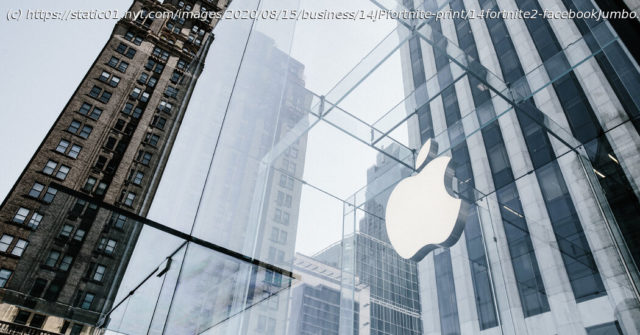App makers like the game company Epic and the music service Spotify are challenging Apple’s right to a large cut of their sales. Regulators have taken notice.
OAKLAND, Calif. — Twelve years ago, Apple introduced the App Store, a peculiar online marketplace for the year-old iPhone. It had 500 offerings. Apple told app makers it would take a 30 percent cut of their sales, and few complained. Today, the App Store is one of the world’s largest centers of commerce, facilitating half a trillion dollars in sales last year alone. And Apple still takes 30 percent of many apps’ sales. That commission has proved hugely consequential for Apple. It has been the primary driver of growth in recent years for a company that has nearly $275 billion in annual sales. And it has created some of Apple’s biggest headaches, drawing antitrust scrutiny, fury from app makers and lawsuits from consumers and partners. The headaches intensified this week when Epic Games, the maker of Fortnite, arguably the world’s most popular video game, sued both Apple and Google, accusing the companies of breaking antitrust laws by forcing app makers to pay their 30 percent fees. The lawsuits followed Apple and Google’s removal of Fortnite from their app stores because Epic encouraged users to pay it directly, rather than through Apple or Google, to avoid their fees. “I think we’re realizing that 30 percent is way too much,” said Phillip Shoemaker, a former senior App Store executive, who left Apple in 2016. Credit card companies charge roughly 3 percent to process payments. “It should be closer to that,” he said. That is the rising sentiment among app developers, consumers and regulators. Apple and Google, which together are worth more than $3 trillion, make the software that backs virtually all of the world’s smartphones. That dominance has allowed them to keep their commissions high. But now that the tech giants’ smartphones have become the only way other businesses reach millions of people, those businesses are increasingly pleading: Do you really need a third of my sales? “There are very few companies out there that have a 30 percent profit margin,” said Andy Yen, the chief executive of ProtonMail, an email service. “The only way we can support this fee is by passing that cost on to customers.” ProtonMail charges 30 percent less for subscriptions purchased on its website, but when the company advertised that to its iPhone users, Apple restricted its app. Likewise, Spotify increased its monthly subscription to $13 from $10 in 2014 to account for Apple’s fee. A year later, Apple introduced a competing music service — priced at $10. To compete, Spotify opted out of Apple’s payment system, enabling it to avoid the commission. Now customers can still use Spotify’s app, but they must subscribe on Spotify’s website. Yet Apple bars Spotify from saying that in its iPhone app. “Either we lose because we have to pay them a 30 percent tax just to operate and raise our prices for consumers as a result, or we lose because it becomes much more expensive to convert users from free to premium,” Horacio Gutierrez, Spotify’s chief legal officer, told reporters in June after European regulators opened an antitrust investigation into Apple based on Spotify’s complaint.






